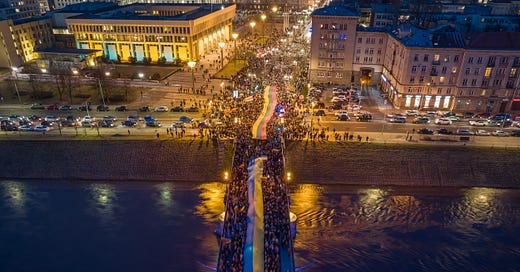One Year Since the Invasion of Ukraine, Let Citizens Lead
Ieva Česnulaitytė on how Central and Eastern Europe found its voice and power in a year of turbulence
Ieva Česnulaitytė is Founding Head of Research and Learning at DemocracyNext, a former Policy Analyst for the Organisation for Economic Co-operation and Development (OECD), and a future fellow at the Institute for Human Sciences.
One year ago, Russia began its invasion of Ukraine, suddenly throwing into jeopardy decades toward democracy in Central and Eastern Europe. But as Ukraine fought back, its neighbours have rallied to its defence.
The war still rages and it is easy to feel despair. But as a Lithuanian democracy expert, I feel confident that our region’s future is bright. It is possible, if we take the right steps, for Ukraine and its neighbours to emerge as more resilient democracies than before.
First, we must recognise the extraordinary outpouring of support for Ukraine from everyday people. Polls show that as of January 2023, two out of three Lithuanians had donated to the Ukrainian defense effort. People in the region welcomed millions of fleeing civilians, crowd-funded millions of euros, and mobilised to penetrate the propaganda wall by sending text messages to Russian citizens.
This is remarkable because, paradoxically, these same countries have abysmal voter turnout and low levels of trust in government. People are still learning to trust one another, to hold their governments accountable, and to embrace their own agency. Thirty years of democratisation has yielded varying levels of success. The Baltic states of Estonia, Latvia and Lithuania score at the top 20 per cent on V-DEM’S Liberal Democracy Index, while Bulgaria and Moldova are still classified as electoral autocracies.
It turns out that a transition to party politics and elections is fairly easy to undermine through corruption and foreign influence. This has led to “hybrid regimes,” with democratic and nondemocratic features.
At the same time, the region has undergone a paradigm shift from communist regimes, successfully implementing reforms and building democratic institutions. Grounded in values of liberty and self determination, there is a palpable openness to innovate and ambition to make up for the years lost under Soviet oppression.
How can we tap into our innate capacity to collaborate and care for others—so apparent over the past year—to build resilience and accelerate our democratic renaissance? When the war ends, how can we help Ukraine do the same?
One key to the future must be the use of Citizens’ Assemblies—a democratic model that has been perfected and implemented close to 600 times, as documented by the OECD.
In assemblies, governments convene groups of everyday people selected by lot and broadly representative of society. Assemblies are empowered to learn, deliberate, build consensus, and develop recommendations that consider the complexities required for solving multifaceted public issues.
My research shows that deliberative assemblies create the conditions for each of us to meaningfully contribute to the common good, assess information critically, and harness our collective intelligence. In doing so, they lead to increased sense of efficacy and agency. Assemblies build democratic resilience in citizens—which helps to counteract autocratic tendencies and influences.
Although democracy has come to be associated with elections, they are not necessarily the most democratic mechanism. Deliberative assemblies with members selected by lot, grounded in ancient Athenian practices and proven to work in the modern context, have been strikingly successful in tackling difficult policy problems— from constitutional changes to allow same-sex marriage to climate change. Successful assemblies have been implemented in Poland, Hungary, Bosnia and Herzegovina, and Estonia. These are not merely democratic “experiments”—there are now permanent assemblies, integrated into local and regional government, operating in Paris and Brussels.
Central and Eastern Europe is well positioned to leap-frog over the paradigm of electoral politics, to a new democratic paradigm of citizen participation and deliberation that taps into the sense of solidarity we have been witnessing.
Understandably, governance innovations in the region have been treated with caution given the ongoing threat of influence from Russia. However, to idolise elections is to ignore the lessons from the Western democratic malaise.
If we fail to take this opportunity, the risk of disillusionment and backsliding to autocracy is not to be underestimated.
Last October, at a Berlin conference on post-war reconstruction of Ukraine, concerns emerged about how reconstruction aid would be used. Billions of euros are already being pledged to the effort.
The solution is to give citizens decision-making power — to decide their priorities for rebuilding. This makes transparency and accountability inherent features of the democratic model, not afterthoughts, and it would grant everyday people a real say about the future of their country.
As Turkish writer Ece Temelkuran has said, autocrats want us to believe we are powerless, and that is dangerous. Multiplying constructive opportunities for citizens to exercise collective agency is the antidote to autocracy.
Will Central and Eastern Europe leap toward the next democratic paradigm? The compassion and everyday heroism we are seeing in the face of this brutal war shows the people are more than ready.






